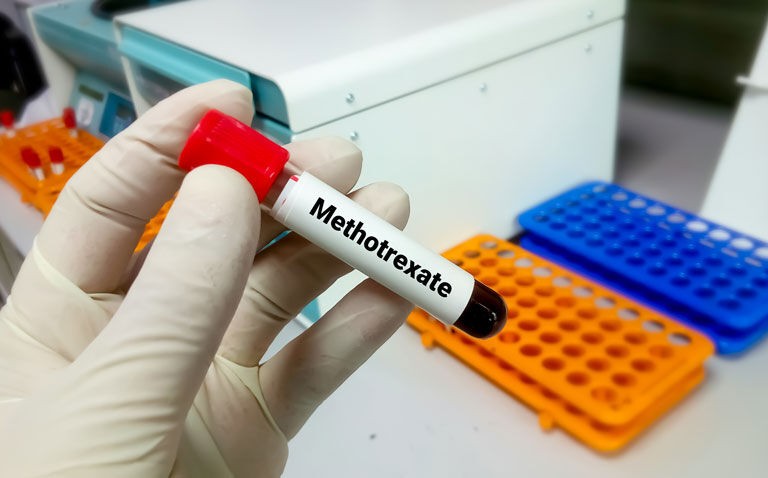Halting methotrexate for two weeks after a COVID-19 vaccination boosted the level of antibodies generated compared with continued drug use
Stopping methotrexate (MTX) for two weeks after a third COVID-19 vaccination significantly enhanced the level of antibodies produced compared to continuing with the drug, according to the results of a randomised trial by a team of UK researchers.
The use of the immunomodulatory drug methotrexate, is known to adversely affect the humoral and cellular immune response to COVID-19 mRNA vaccines. In fact, studies have shown that seroconversion rates after COVID-19 vaccination are significantly lower in immunocompromised patients, especially organ transplant recipients.
As a result, it is important to implement strategies that can enable those who are immunocompromised to mount a satisfactory immune response.
In fact, the highest immune response occurred when MTX was discontinued two weeks after vaccination and this effect was confirmed in another study that specifically focused on stopping the drug two weeks after seasonal influenza vaccination.
Since the effectiveness of this approach has not been formally evaluated for the COVID-19 vaccine, for the present study, the UK undertook a randomised trial among immunocompromised patients prescribed methotrexate.
The Vaccine Response On/Off Methotrexate (VROOM) trial, randomised participants 1:1 to either suspension of MTX (suspend methotrexate) for two weeks immediately after their COVID-19 booster dose, or to continue with the drug as usual (continue methotrexate). Individuals were recruited from both rheumatology and dermatology clinics and who had been taking low dose MTX (< 25 mg/week) for at least 3 months. In addition, the researchers only enrolled participants who had previously received two COVID-19 vaccine doses.
The primary outcome of the study was the antibody response against the receptor-binding domain of the COVID-19 spike protein (S1-RBD) 4 weeks after receipt of the third COVID-19 vaccine dose. Secondary outcomes included S1-RBD antibody titres at 12 weeks post-vaccination and self-reported levels of disease activity.
Methotrexate suspension and S1-RBD antibody response
A total of 254 individuals with a mean age of 59.1 years (61% female) were included in the trial and randomised equally to either strategy. Overall, 51% of participants had rheumatoid arthritis, 34% psoriasis and 20% a skin condition alone. The median dose of methotrexate taken as 20 mg/week.
After 4 weeks, the geometric mean SI-RBD antibody titre was 22,750 U/ml in the suspend methotrexate group and 10,798 U/ml in the continue methotrexate group (p < 0.0001). This increase was independent of the dose and administration route of methotrexate, as well as type of immune-mediated inflammatory disease and age. Moreover, this difference in response remained significant at week 12 (16,520 vs 8094).
One downside of the study was that significantly more patients in the suspend methotrexate group self-reported at least one disease flare over the 12 week period compared to those who continued with the drug (71% vs 45%, odds ratio, OR = 2.83, 95% CI 1.64 – 4.88). However, these flares were generally self-managed and without any major impacts on quality of life.
The authors concluded that their strategy of stopping MTX was both safe and boosted the level of COVID-19 antibodies and called for further studies to examine the effect of stopping other immunosuppressant drugs on the level of antibody response.
Citation
Abhishek A et al. Effect of a 2-week interruption in methotrexate treatment versus continued treatment on COVID-19 booster vaccine immunity in adults with inflammatory conditions (VROOM study): a randomised, open label, superiority trial. Lancet Resp Med 2022










